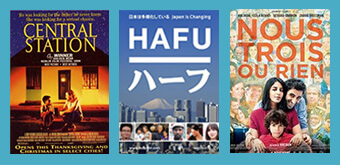September 7, 2017
World Film Forum to illuminate cultural crossroads
 World Film Forum: Sept. 12, 19, 26
World Film Forum: Sept. 12, 19, 26
The Fall 2017 World Film Forum will bring films on the topic of "Community at the Crossroads" from Brazil, Japan and France. The presentations, free of charge will start at 7:30 p.m. on Tuesdays, Sept. 12, 19 and 26, at the West Lafayette Public Library, 208 W. Columbia St.
A brief introduction to each film will be given before the screening; further discussion will follow the film. All films are shown with English subtitles.
As context for this year's theme, Hongjian Wang, assistant professor in the School of Languages and Cultures: "For this year's World Film Forum, we took inspiration from the proud motto of Indiana, 'the Crossroads of America.' We would like to invite everyone, through the lenses of world cinema, to see and discuss communities at all kinds of crossroads, be they temporal, spatial, spiritual, social, cultural, racial, and so on. We believe a discussion like this will enlighten our understanding of the ever-changing world as well as ourselves."
Sept. 12: "Central Station"
Directed by Walter Salles
1998; Brazil; 1 hour, 53 minutes; drama
Presenter: Paul Dixon, professor of Portuguese and Spanish, School of Languages and Cultures
Dora, a former teacher, now earns a living by writing letters for illiterate clients at Rio de Janeiro’s main train station. She witnesses a fatal accident in which a woman unwittingly steps in front of a speeding bus, and reluctantly takes the woman’s young son, Josué, under her wing. Although he has never met his father, Josué is convinced that he should try to find him in Brazil’s remote northeastern region. Dora and Josué embark on an adventurous road trip, in which contradictory realities of a Brazil in the process of modernization are revealed. The search for the boy’s father is more challenging than expected, and it prompts the question of whether the man is really worth finding. But intermediate steps provide valuable lessons, and the means are revealed to be more important than the ends. A Brazilian-French co-production, the film was critically acclaimed, and was nominated for the Oscar for Best Foreign-Language Film. Like many Brazilian films, "Central Station" expertly shows how intense personal narratives are inseparable from broader social and political realities.
Sept. 19: "Hafu: The Mixed-Race Experience in Japan"
Directed by Megumi Nishikura and Lara Perez Takagi
2013; Japan; 1 hour, 30 minutes; documentary, biography
Presenter: Nagi Fujie, graduate student of Japanese linguistics, School of Languages and Cultures
“Hafu” is a Japanese term for someone who is half-Japanese, and half- “other.” This documentary movie takes a look at the lives of five Hafu individuals and families who came from a wide variety of backgrounds, one as close as South Korea and another as far as Ghana. The movie shows the changing demographics of Japan, especially the reality of increasing populations of people of non-Japanese ancestry or origin living in Japan. Japan’s often insular culture makes it hard for some of these Hafu to adapt, or feel secure in their own identity. Although it focuses on Japanese society, Hafu contains broader insights into acceptance, societal perception and sense of self.
Sept. 26: "Nous trois ou rien"
Directed and written by Kheiron
2015; France; 1 hour, 42 minutes; comedy-drama
Presenter: Riham Ismail, PhD candidate, comparative literature
What is a persecuted Iranian to do? Fleeing from the political persecution of two successive political regimes (the Shah and Khomeini), Hibat, a young Iranian, finds himself forced to flee his country out of fear for his and his family’s life. Étranger and immigré in France, Hibat and his wife, Fereshteh, eventually settle in the rough banlieue of Pierrefitte-sur-Seine, along with a large alienated, impoverished immigrant community on the outskirts of Paris. Unequivocally, Hibat’s story echoes the story of thousands of refugees and asylum seekers, a particularly vulnerable class of people who, in so many cases, have no other option except to escape their country to seek refuge from persecution and violence. In an inspiring, hilarious, yet honest portrayal, director and standup comedian Kheiron narrates his family’s journey from the political unrest of late '70s Iran to a disadvantaged and excluded suburb of Paris. The movie won several awards including the Special Jury Prize at the Tokyo International Film Festival in 2015 and the Audience Award at the Munich Film Festival in 2016.

